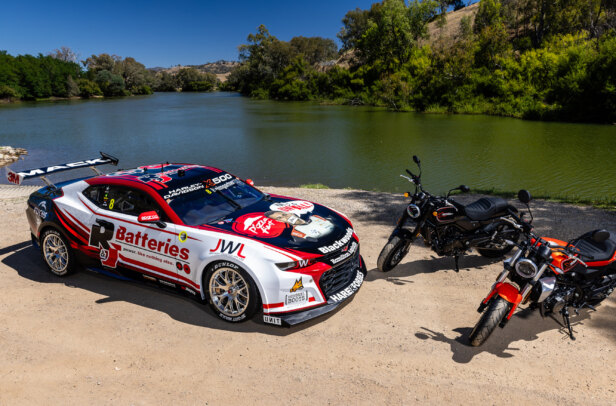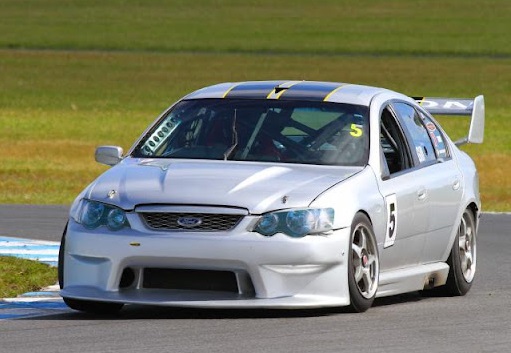THOMAS Randle says racing drivers think they’re invincible. In fact, that statement could generally be applied to the male populace and the way they view their health – some blokes seem to think a visit to the doctor is more gruelling than Bathurst!
First published in the October 2021 issue of Street Machine
At 25 years old, Thomas is a rising Supercars star who battled testicular cancer as he chased his dream. After starting his career in karts, Thomas kicked on into open-wheel racing, winning the Aussie Formula Ford title in 2014 and coming runner-up in the Formula 4 Championship in 2015. After a competitive stint in Europe, Randle returned home to compete in the Super2 series for 2018, nailing the championship in 2020.
Having landed a full-time drive for Tickford Racing in 2022, Thomas is hoping to emulate the success of drivers like John Bowe, a two-time Bathurst winner, former Touring Car champion, Hall of Famer and recent OAM recipient. John, who’s still carving it up in Touring Car Masters and almost anything with a steering wheel, has been treated for prostate cancer in 2021 but now seems to be back in clear air.
The two men spoke with Street Machine about the challenges they’ve faced and why it’s worth racing to your doctor at even a hint of something amiss.
What was the first sign that something was wrong for you guys, health-wise?
THOMAS RANDLE: I first noticed something was wrong in Newcastle in 2019. One of my seatbelts got sort of caught on my manly area, which is not an uncommon thing to happen to a male race driver, and it’s quite excruciating pain. A week later I could still feel a bit of a pain in that area, as if I was getting kicked in the nuts. I thought, “That’s not good.”
JOHN BOWE: If I didn’t have a Motorsport Australia licence, if I hadn’t had the medical check for it, I wouldn’t have found out. It’s quite bizarre. My mate Hammo, he had prostate cancer and needed to have it operated on. About the same time, I was due for my licence renewal with Motorsport Australia. So when I went to do my licence renewal, obviously it requires a medical, but I also asked my doctor, “Can you just check my bloods and see if I need any servicing?”, just like an old car.
Scary stuff – did you guys jump on it?
TR: I sort of left it. I thought it wasn’t going to be anything serious because I’m young, I’m a race driver, I don’t do anything wrong. Then you find yourself doing the wrong things in terms of getting on Doctor Google and sort of researching your symptoms, and that was when I started seeing things pop up that I really didn’t want to see. You know, you see testicular cancer come up, and you think, “Nah, it can’t be that.” I waited about six weeks before I ended up biting the bullet. I was a little bit nervous, but I just thought, “You know what, this has been long enough, this doesn’t feel right.” So I got the courage – got the balls, you could say – to see my GP.
JB: The check came back with the PSA [prostate-specific antigen] level high, so in 18 months it had changed from perfectly normal, which it had been for years, to too high. The doctor sent me to do another PSA and that was still high, so it wasn’t a mistake.
TR: They referred me to get an ultrasound because they thought things weren’t quite right. That same day, as soon as I got the ultrasound done, they kind of said, “You need to go back to your GP immediately.” That’s when they looked me in the eye and said, “You’ve got cancer.” I don’t really know how to describe it. It all hit home.
JB: The fact is, you don’t know whether you’re going to die or not. It’s quite confronting. You go, “Shit, here I am, this life of adventure, and crikey, I might croak!”
TR: It was certainly… [long pause] I don’t know how you can be prepared for that. Your GP is looking at you, in the eye, and saying that you have cancer. You start thinking the worst. You think, “Is this it?” I know it probably sounds silly, but it’s kind of what you’re thinking. “Is this it? How long’s left to live?” You think all of these really bad thoughts.
How the hell do you deal with something like that?
TR: I understand it so much more. I know testicular cancer is one of the most curable cancers in young adults. It’s also one of the most common cancers for young adults. So that’s certainly helped me a lot. It was just an extremely rough, challenging time. I mean, there were points last year where I had my highs, thinking I was in the clear, and then there were times when they thought, “Oh no you’re not.” It was just sort of the merry-go-round of emotions.
JB: I had the brachytherapy surgery, which is where they stick big, long needles with huge doses of radioactive stuff on ’em and blast the cancer cells – that’s the most simplistic way of describing it – and then a couple of weeks later I started radiation therapy. I went to the Peter MacCallum Cancer Centre out at Moorabbin Hospital. I’d go each day, and the staff there were fabulous; they treated me well. You’re only there for half an hour, max, and they blast you with radioactive things, and that’s supposed to fix it, and I think it has. My last PSA test, I spoke to Scott [Professor Scott Williams], and he said I’m well ahead of the game. I’m just assuming that I’m okay, and I think I am.
How has the support been from the general public?
TR: The public support was quite a nice feeling. In a way I feel quite lucky compared to some people in the world that have to go through such a terrible thing. I mean, cancer is horrible, and having to go through chemo is not much better. Some people can be quite lucky in that they get the initial diagnosis and then just have their tumour removed and press on, which is what we were hoping for, but unfortunately it wasn’t meant to be. In saying that, I am very lucky that I can say that I’m in the clear now, because there’s some people in the world who can’t.
JB: So many people shared things on social media, and wherever I went people said, “Thank you. You’ve galvanised me into going to get checked.” People have shared their family history. Across the board it was very nice, and regardless of who you are, if you actually make a difference to someone’s life, it’s quite a nice feeling, like a powerful feeling, you know. I understand why people do a lot of social welfare work and things like that, ’cos it’s a good feeling to do something for the greater good.
TR: The Peter MacCallum Cancer Centre helped me the most. There’s just so many lovely people that work there. We’re very lucky that there’s such nice people in this world that can help you get through a scenario like that, because that’s what you need. You need to have a positive attitude, and recovery is very much brought on by your environment that you’re surrounded by.
JB: Nowadays, it’s easier to communicate because of social media. Sometimes that’s a good thing, sometimes that’s a bad thing. To be in a position to make a difference is something you should not dismiss lightly, as an individual anyway. That’s why I started to advocate that all males, particularly males over 40, should have a PSA check. And it went, you know, I literally mean 30-40,000 comments about it.
How has motorsport figured into all this?
TR: My oncologist said that he was fine with me doing a Bathurst in 2020, before I started chemo. It wasn’t going to change the result. I got back from Bathurst and the next day I was in having my CT scan. My positivity sort of varied from time to time. I mean, you have your down moments; as long as you aren’t down all the time. I was actually just thinking about my racing and thinking about just wanting to be back in the car and showing people what I can do. That was my motivation. Thinking about the S5000 helped, and at the same time we were trying to push for that full-time Supercars drive. Unfortunately it didn’t work out for 2021, but next year it’ll be fine; I’m very happy with the outcome.
JB: Yeah, motorsport is a tonic. But when I was a “professional driver”, I didn’t see it that way. You know, sometimes if you were going well you were on top of the world, and if you weren’t, your mental state of mind or your feeling of wellbeing went up and down with how your car was going. If you race in a historic class of some sort, half of it’s the camaraderie, it’s the fun, the joy of driving, so I’m certainly sure I’ll be able to race for a bit longer yet. Whether I race when I’m 80, it’ll be a body-mind thing, but I’m not ready to hang up the helmet yet, that’s for sure.
TR: I guess in your head you have some doubts: “Is this going to affect my ability after chemo?” Because chemo basically destroys your body. I didn’t even know if I was going to be able to walk because I had no strength. First race back in the S5000 at Tassie, we thought if I can’t even get through practice, that’s all right, you know, we’ve given it a crack. Anyway, we ended up doing the whole weekend and somehow ended up winning the bloody thing. That was probably one of my favourite wins. I’m now on the Youth Cancer Action Board. There’s 12 members, and every member is between the ages of 15 and 25 and has gone through a cancer diagnosis. Hopefully we can help to make changes to improve other young cancer patients’ experiences.
JB: We made some stickers to raise awareness and had lots of response from lots of people. I’ve got a helmet that I use in one of my friend Joe Calleja’s cars, and I’ve got that done up as a sticker that potentially sticks the middle finger up at cancer.
Any parting advice for those reading?
TR: One thing I’ve learnt is not to take your health for granted, because one day you can be feeling good, and the next day you could be diagnosed with cancer. Certainly, if you feel like something’s not quite right, there’s no harm in getting it checked out because it will put your mind at ease. And if it is something, at least you’ve gone early. It could save your life.
JB: If you’re 40 or over, just get a PSA test. It’s a little needle prick, takes a bit of blood out of you and they analyse it, and your PSA level will indicate if there’s something amiss with your prostate. It’s a cheap bit of advice, really, and it’s easy to do. There are a lot of different cancers and lots of people survive and lots of people don’t, so anybody that’s survived, like Thomas and I, we all should be grateful. And as for the medical system in Australia, that Peter Mac place is unbelievable. It’s incredible. We just get up in the morning, we try and do something meaningful, and we go to bed at night, and if you can have a bit of fun on the way through, well, you don’t really think about how disease and things affect people, but having walked it, it’s definitely a journey.




Comments